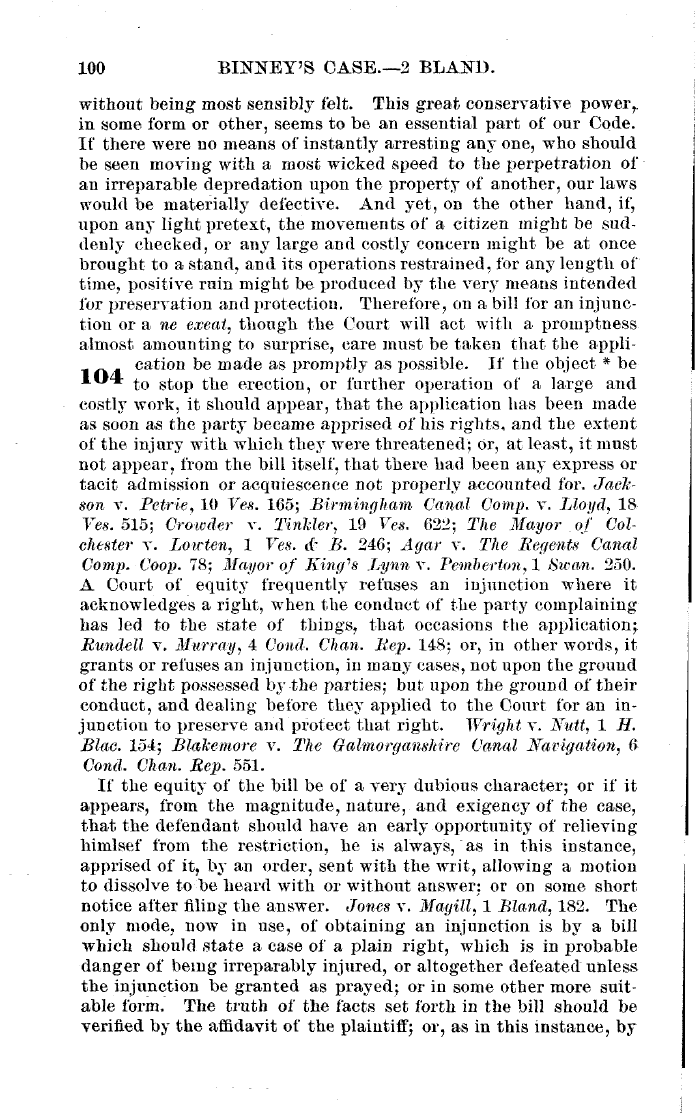|
1(fq BINNEY'S CASE.-2 BLAND.
without being most sensibly felt. This great conservative power,
in some form or other, seems to be an essential part of our Code.
If there were no means of instantly arresting any, one, who should
be seen moving with a most wicked speed to the perpetration of
an irreparable depredation upon the property of another, our laws
would be materially defective. And yet, on the other hand, if;
upon any light pretext, the movements of a citizen might be sud-
denly checked, or any large and costly concern might be at once
brought to a stand, and its operations restrained, for any length of
time, positive rain might be produced by the very means intended
for preservation and protection. Therefore, on a bill for an injunc-
tion or a ne exeat, though the Court will act with a. promptness
almost amounting to surprise, care must be taken that the appli-
cation be made as promptly as possible. If' the object * be
104 to stop the erection, or further operation of a large and
costly work, it should appear, that the application has been made
as soon as the part- became apprised of his rights, and the extent
of the injury with which they were threatened; or, at least, it must
not appear, from the bill itself; that there had been any express or
tacit admission or acquiescence not properly. accounted for. Jack-
son v. Petrie, 10 Tres. 165; Birmingham Canal Comp. v. Lloyd, 18-
yes. 51.5; Cr°o-wider v. Tinkle)-, 19 lies. 622; The 314gor of Col-
chester r. Loarten, 1 Yes. ct- B. 246; Agar v. The Regents Canal
Comp. Coop. 78; llla,gor of wing's Lynn. v . Peviberton, 1 Swan. 250.
A Court of equity frequently refuses an injunction where it
acknowledges a right, when the conduct of the party complaining
has led to the ,state of things, that occasions the application;
Rund.ell v. llfurrag, 4 Co-nd.. Chan. Rep. 148; or, in other words, it
grants or refuses an injunction, in many cases, not upon the ground
of the right possessed by-the parties; but, upon the ground of their
conduct, and dealing before they applied to the Court for an in-
junction to preserve and protect that right. Wright v. Nutt, I H.
Blae. 154; B7akentore v. The Gadrnorganskire Canal Narigation, G
Con d. Chan. Rep. 551.
If the equity of the bill be of a, very dubious character; or if it
appears, from the magnitude, nature, and exigency of the case,
that the defendant should have an early opportunity of relieving
himlsef from the restriction, he is always, as, in this instance,
apprised of it, by an order, sent with the writ, allowing a motion
to dissolve to be heard with or without answer: or on some short
notice after filing the answer. Jones v. Magill, I -Bland, 182. The
only .mode, now in use, of obtaining an injunction is by a bill
which should state a case of a plain right, which is in probable
danger of being irreparably injured, or altogether defeated unless
the injunction be granted as prayed; or in some other more suit-
able form. The truth of the facts set forth in the bill should be
verified by the affidavit of the plaintiff; or, as in this instance, by
|

